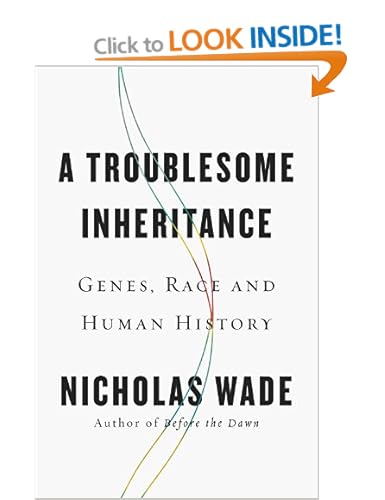Is the author going to be sacrificed on the altar of ‘racism’? Wade is naturally keen to defend the scientific study of human racial differences from the inevitable charges of racism and eugenics. This is a difficult discussion and one the author approaches historically, showing how American ideas of Caucasian superiority and eugenics were eagerly picked up by the German National Socialists. But in the urge to be on the side of decency one has to be careful to reason accurately:
“By analogy with animal breeding, people could no doubt be bred, if it were ethically acceptable, so as to enhance specific desired traits. But it is impossible to know what traits would benefit society as a whole. The eugenics program, however reasonable it might seem, was basically incoherent.” (p. 27).Well, it seems that intelligence, a generally pro-social personality and good health are pretty good candidates for traits which would ‘benefit society as a whole’ and later the author will argue that western medieval societies effectively bred for those traits over the last thousand years to our advantage. We do our own private experiments in positive eugenics whenever we seek out the best possible marriage partner.
Such sloppy argumentation is, sadly, not uncommon in this book.
Having got his defences out of the way, Wade now gives us some science -a comparison between chimpanzee societies and our own. Chimps are highly aggressive and promiscuous; humans not so much. In fact the key differentiator is our marked ability to cooperate. Wade has some plausible ecological suggestions as to how these differences might have emerged and can back up the behavioural stuff with genes coding for hormones such as oxytocin (increased trust within an in-group) and mono-amine oxidase (associated with aggression).
The gene which codes for the latter, MAO-A, comes in different alleles – the “two-promoter group” in particular is linked with criminal violence. In a large study, (p. 55), Jean Ship and colleagues found that African-American men had a 5% chance of carrying the “two-promoter” allele (these were predominantly the delinquents). In Caucasians the proportion was 0.1%. Clearly we are at an early stage in this research but the correlations are certainly thought-provoking.
The next few chapters reprise the story of the out-of-Africa human expansion and how this is captured in genetic sequencing. This will be familiar to anyone who has checked out 23andme or similar companies. The arguments for the objective existence of races are kind of obvious to anyone without an agenda, and are apparent in analysis of allele frequencies. Nevertheless, it remains true that in 2014 we know next to nothing about what most of these variant alleles actually do. Most cognitive, psychological and behavioural traits are under the control of hundreds or thousands of alleles, each of small individual effect, which accounts for the ‘bell-shaped curves’ we see in population intelligence and personality attributes. This is a central problem for a book which is trying to create a compelling connection between race genetic differences and the distinctiveness we see today in human civilizations such as in the West (America, Europe), the East (China, Korea, Japan) and sub-Saharan Africa.
Such differences clearly interest the author and drive the second half of the book - which he deems ‘speculative’. The author is particularly interested in how humanity made the transition from its default social model, kin-based tribalism, to states and empires. Citing Francis Fukuyama (“The Origins of Political Order”), Gregory Clarke (“Farewell to Alms”) and Daron Acemoglu & James A. Robinson (“Why Nations Fail”) we are taken on a multi-millennial tour of the great civilisations of the world. What was the evolutionary impact of these novel social environments on population psychology? His thesis is that of gene-culture coevolution – that people were selected for ‘tameness’ and prosociality as well, perhaps, for greater intelligence. There are good reasons for believing this is likely, but it has to be said that it may take a few more decades to get compelling genetic evidence.
The “IQ and Global Inequality” authors Richard Lynn and Tatu Vanhanen get short shrift (p.191). They have demonstrated high correlations (c. 80%) between measurements of national IQ and GDP. Given the well-known strong genetic underpinnings of observed intelligence (in societies without widespread material deprivation) it’s surprising to see Wade backsliding into confusion here. By highlighting poor and outlying data he makes his doubts clear but it just reads like he has an agenda. Perhaps he thinks his book is controversial enough as it is.
The final chapters cover the astonishing intellectual success of the Ashkenazi Jews, citing the well-known work of Gregory Cochran, Jason Hardy and Henry Harpending (written up in “The Ten-Thousand Year Explosion”) and further speculate about the reasons behind the rise of the West in recent history. Interesting but does not break any really new ground.
This is a readable book but one which lacks a strong sense of direction. Occasional sloppy reasoning and ideological argumentation can irritate. Gregory Cochran has identified some errors of fact (on the “West Hunter” blog) which highlight the limitations of the author’s genetics sourcing but this is not where Wade’s real interests lie. He is clearly infuriated by the assumption of human genetic uniformity in economics, history and public policy and is consequentially highly motivated to give an account of the world as if human and racial differences actually mattered. In the current absence of hard genetic results his views remain plausible but speculative and will probably be ignored by politicians and policy-makers for another generation, more’s the pity.
